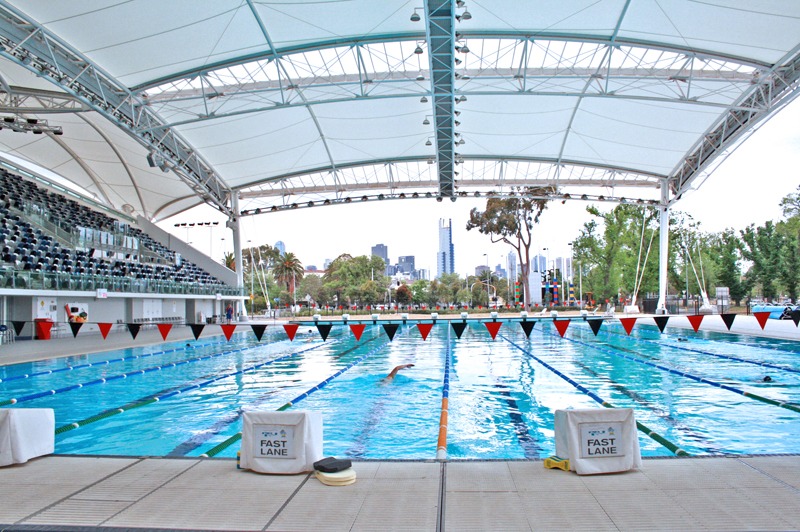While swimming pools provide invigorating relief from the heat, the chlorine used to keep them sanitized can take a serious toll on your skin. This harsh chemical strips away your skin’s natural oils, leaving it dry, irritated, and more susceptible to damage. You can notice the effects through skin’s pH disruption, which compromises your protective barrier and leads to beneficial bacteria damage.
The risks don’t stop there. When you’re exposed to chlorinated water for extended periods, you’re facing potential sun damage and premature aging. Even more concerning, chlorine combines with organic matter to create toxic by-products called chloramines. If you have sensitive skin, you’re particularly vulnerable to chemical burns and rashes from high chlorine concentrations.
Consider heading to the beach instead, where natural exfoliation from sand can actually improve your skin’s health and appearance.
Image: Oleg Bkhambri (Voltmetro), Kazan 2015 – Katie Ledecky wins 400m freestyle (cropped), CC BY-SA 4.0
Essential Pre-Swimming Skin Protection Steps
Taking proper precautions before diving into the pool can shield your skin from chlorine’s harsh effects. Start by removing all makeup, as it can react negatively with pool chemicals.
Next, take a quick shower – this helps minimize how much chlorine and water your skin absorbs while swimming.
Create a moisturizing barrier application by using products containing squalene and zinc. Don’t forget to apply a chlorine-neutralizing lotion to provide additional protection against chemical exposure. For proper sun protection, especially during outdoor swimming, use waterproof sunscreen and reapply it every two hours.
Plan your swim sessions for early morning or late afternoon to avoid intense UV exposure. These simple steps will help maintain your skin’s health and protect it from both chemical and sun damage.
Quick-drying fabrics like nylon and polyester blends are ideal for swimwear as they help prevent skin irritation from prolonged moisture exposure.

Image: Photo by www.localfitness.com.au, Olympic Swimming Pool – Fast Lane, CC BY-SA 3.0
Best Practices During Your Swim Session
Three key practices during your swim session can greatly protect your skin from chemical damage. First, limiting swim duration to 2-3 hours is essential, as prolonged exposure to chlorine can irritate your skin. Take regular breaks during this time to rinse off with fresh water, which helps remove chemical buildup and keeps your skin hydrated.
Swimming in outdoor pools offers better protection since chemicals can dissipate into the air more easily. Time your swim sessions strategically by avoiding peak sun hours – opt for early morning or late afternoon swims to minimize UV exposure. Don’t forget to wear a swim cap, which not only shields your hair from chemicals but also protects your scalp from sun damage. These simple practices will help maintain your skin’s health while enjoying your time in the pool. Remember to apply titanium oxide sunscreen before swimming, as it provides gentle protection for sensitive skin while preventing inflammation and redness.
View this post on Instagram
Post-Swimming Skincare Routine
A proper post-swim skincare routine is crucial for protecting your skin from the harsh effects of pool chemicals. Don’t wait to shower after swimming – head straight to the locker room to rinse off chlorine and other irritants. Use lukewarm water and a gentle, fragrance-free cleanser to avoid further skin sensitivity.
Pat your skin dry instead of rubbing it with your towel, which can cause irritation. Next, apply a moisturizing cream to restore your skin’s protective barrier. For extra care, you can incorporate nourishing face masks and soothing bath soaks into your routine.
Don’t forget about your hair – it needs attention too. Apply a deep conditioning treatment to repair any chemical damage and restore moisture. These simple steps will help maintain healthy skin and hair despite regular swimming. Using a wide-tooth comb helps prevent tangled and damaged hair when detangling after your swim.

Image: Sarah_Ackerman from New York, USA, SkyPark Infinity Pool (view from deckchair), CC BY 2.0
Natural Remedies for Swimmer’s Skin
Natural solutions offer swimmers effective protection against harsh pool chemicals without relying on commercial products. You can apply coconut oil or aloe vera as natural moisturizers before swimming to create a protective barrier against chlorine. After your swim, try an apple cider vinegar rinse to neutralize chemicals and restore your skin’s pH balance.
For skin sensitivity management, soothe irritated skin with an oatmeal bath or oatmeal-based products. Enhance your skin’s resilience by drinking green tea or taking vitamin C and E supplements, which help combat chlorine’s harmful effects. Use a gentle exfoliant made with baking soda or sugar to remove chlorine buildup and dead skin cells. These natural remedies effectively maintain healthy skin while enjoying your time in the pool.
View this post on Instagram
Conclusion
Swimming should be enjoyable, not a cause for skin concerns. Taking proactive steps to protect your skin before, during, and after swimming can help prevent dryness, irritation, and long-term damage. Hydrating properly, using effective sun protection, and following a solid post-swim skincare routine will keep your skin healthy, so you can continue enjoying the water without worry.


